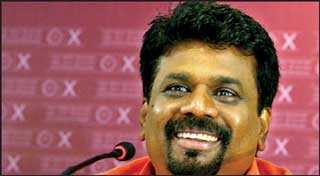Friday Feb 27, 2026
Friday Feb 27, 2026
Tuesday, 5 November 2019 00:30 - - {{hitsCtrl.values.hits}}
By Chandani Kirinde
National People’s Power (NPP) presidential candidate Anura Kumara Dissanayaka yesterday spelled out the economic policies of his party, which he said would lift the country out of poverty and minimise discrepancies with the distribution of wealth.
 |
Anura Kumara Dissanayaka |
“Our aim is to create a balanced economy to bring about continuous development with a stable growth ratio so that discrepancies in the distribution of income can be minimised and economic benefits can be fairly distributed,” Dissanayaka told reporters at a press briefing.
The JVP leader said that after 71 years of self-rule, the country had been left drowning in the depths of poverty due to corruption and economic policies that favoured Sri Lanka’s rulers more than its people.
“The NPP has the strongest manifesto among all the presidential candidates. Our economic policies aim to create a prosperous country and we have the right policies to turn things around,” Dissanayaka said.
He said Government statistics showed that there were two million beneficiaries of the Samurdhi scheme which was a reflection of the extreme poverty present within the country.
“Being poor is not just about a lack of money but also a lack of housing, sanitation, education, health and social acceptance. We plan to pull people out of this poverty,” Dissanayaka stated.
The reason for this poverty he said was a failure to prioritise programs that benefitted the public.
“When the Army wanted multi-barrel guns when they were fighting at Elephant Pass, the then-Government got down these guns and no one said there was no money. When the previous Government wanted to get down aircraft, they ordered the aircraft without saying there was no money. In fact they paid for eight MiG aircraft and got only four. The problem is not a lack of money. It is the failure to prioritise the needs of the people,” he declared.
The NPP candidate said that his polices were part of a well-structured plan designed to free the country from its present debt trap.
“We will take loans only for capital expenditure and for infrastructure development. Whatever loans we take will be managed in a way that not only allows us to pay off our existing debts but also settle the new loans we take,” he added.
Dissanayaka said the engine of growth in an NPP Government would be the small and medium-scale businesses.
The NPP’s policies include establishing 100 small and medium-scale factories housed within all of the country’s districts, producing goods through the utilisation of domestic resources, inaugurating 100 agro-productivity villages that will promote the diversification of export crops, creating 15,000 village-level female entrepreneur clusters, initiating large-scale trade and exchange centres within all districts that will be kept open 24 hours a day and opening 2,000 new software and electronics companies within the next five years.
The NPP also plans to write off small-scale loans obtained from State banks for agricultural or trade purposes that have not been settled, following a thorough investigation; amend the Inland Revenue Act to introduce a straightforward and simple tax system; settle, without interest, loans offered by the Government to rural folk who are caught in a micro debt trap and provide them with capital and guidance to engage in fruitful enterprises; provide employment opportunities or guaranteed permanent income through entrepreneurial projects for those who have passed the G.C.E Advanced Level examination and graduates of Samurdhi-recipient families and increase the Samurdhi allowance extended to 600,000 low-income households to Rs. 10,000 until their finances were strengthened.
The NPP also plans to create 200 community-centred villages at environmentally friendly and culturally important sites while money sent by Sri Lankan employees in foreign countries will be exempt of all taxes, with each of them also being presented with a house which they will be able to pay for in installments.
The NPP candidate said the 16 November election was a decisive contest and could change the direction in which the country was headed.
“We need to heighten the political discourse within the country which is at a comically low level at the moment. The NPP aims to raise this to a higher standard,” he said.
